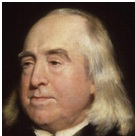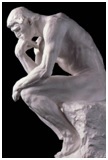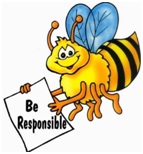|
 |
|
 |
John Stuart Mill - Philosophy, Ethics and Happiness
John Stuart Mill (1806-73)
English philosopher (pictured right) famous for his support of:
His most famous books are... On Liberty (1859) and Utilitarianism (1863).
What did he teach about ethics and happiness?
1. Utilitarianism This says you should do things that:
Mill’s “Greatest Happiness Principle” says:
He supported the English founder of utilitarianism, Jeremy Bentham (1748-1832) Bentham (pictured right below) said what is right is any action that is most likely to give “the
greatest happiness of the greatest number”.
Happiness comes from
a) material pleasures Things you consume. b) pleasures of the mind (thinking, peace of mind and doing something moral, useful and creative). These “higher” pleasures are more important. “It is better to be a dissatisfied human being than a satisfied pig”, he said.
2. Will and purpose You must have the will (or self-motivation) to do good. So it’s important to be driven by the right aims and desires. If you want something badly enough, you’ll get it. “Will is the child of desire”, he said.
3. Liberty In his book On Liberty (1859), Mill’s “Liberty (or Harm) Principle” says that: You should be free to do anything (including freedom of speech, thought and worship), as long as you
don’t harm anybody else. Self-protection is the only exception to this rule. Don't blindly follow everyone else but:
Mill:
4. Watch the consequences of your actions Morality (what is right or wrong) depends on the consequences of your actions (how
they affect other people). Think about the probable consequences of all possible options before you act, then choose the one that probably will do the most good. Good motives and intentions aren’t enough. You must do good in the world.
5. Good government The laws of a democratic government must be obeyed, but it must increase people’s happiness without removing their liberty. 6. Personal responsibility People must take responsibility for their happiness, not to rely on others including the government. “A country is only as good as the people in it”, he said.
7. Education Education is important to encourage people to help others rather than just help themselves. 8. Supporter of women’s rights Everyone has the right to vote including women, who should be treated the same as men. His wife, Harriet Taylor (pictured right), was also a campaigner for the rights of women who were then treated as inferior.
Key quotes on freedom The only purpose for which power can be rightly exercised over any member of a civilized community against his will is to prevent harm to others, Mill’s Liberty (or Harm) Principle. If all mankind, minus one, were of one opinion, and only one person were of the contrary opinion, mankind would be no more justified in silencing that one person than he, if he had the power, would be justified in silencing mankind.
Key quote on happiness Ask whether you are happy, and you cease to be so.
Key quote on creativity That which seems the height of absurdity in one generation often becomes the height of wisdom in the next.
Key quote on time management What we can achieve depends less on the amount of time that we possess than the use we make of our time.
Key quote on ethics A person may cause evil to others not only by his actions but by his inaction.
Key quote on politics and government All political revolutions, not affected by foreign conquest, originate in moral revolutions.
Key quote on society A country is only as good as the people in it.
Key quote on influencing people A man who has nothing for which he is willing to fight is a miserable creature.
Key quote on learning and wisdom The true philosophy is the marriage of poetry and logic. |
|
|
||
|
|
|
||
|
||
| Copyright © wisdomtowin.com All Rights Reserved | ||
|










